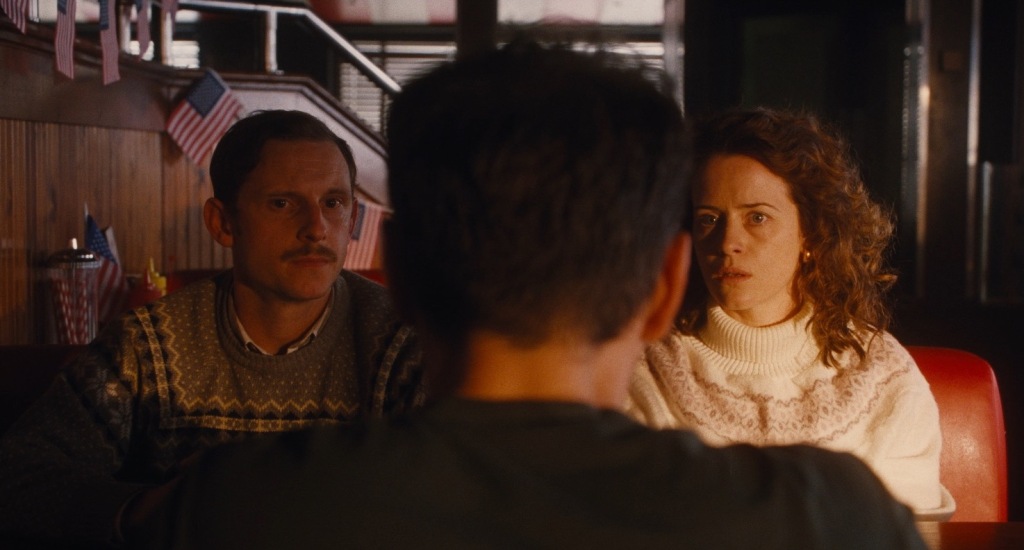
Directed by Andrew Haigh — Screenplay by Andrew Haigh.
Loosely based on Taichi Yamada’s 1987 novel titled Strangers, Andrew Haigh’s All of Us Strangers follows Adam (played by Andrew Scott), a lonely screenwriter living in a high-rise London apartment building. One night, a drunk neighbor, Harry (played by Paul Mescal), knocks on his door hoping to have a good time with Adam that night. Though Adam refuses, Adam starts getting closer to Harry in the days to come. This is in part because he’s starting to work through some of his issues. Why now all of a sudden? Well, when, one day, Adam takes the train back to his hometown to look at the town he grew up in and around, he is approached by a man (played by Jamie Bell) who turns out to be his father. Adam’s parents died in an accident when he was just a young boy, and yet here is his father — at the exact same age that he was when he passed away. His father invites Adam back to his childhood home where he finds his mother (played by Claire Foy), who is also the same age that she was when she died. Overjoyed to reconnect, Adam and his parents gradually start to open up about things once left unsaid.
All of Us Strangers is the kind of film that the phrase ‘hauntingly beautiful’ was made for. It is this strange but loving romance fantasy that could be interpreted as a ghost story. Haigh’s adaptation weaves love and grief together in a narrative that, in part, seems to be about pushing oneself — or being pushed — to love oneself, open up to others, and overcome loneliness and fear thereof. But it is also very much a film about a certain experience that not all of us have. This film, unlike the novel I’m told, focuses on the experiences of gay people and the loneliness of feeling like a, as one character puts it, stranger, even within your family. The film takes the perspective of someone who has never come out to his parents, because they died when he was very young, and, as such, it works as this kind of wish-fulfillment fantasy for people who feel like they never got to show their loved ones who they really were. It is a concept that is probably resonant for just about anyone who has lost someone, but, of course, queer people may have more complex feelings on the subject given that a queer person in that situation may not know whether or not they would be accepted for who they are.
And those scenes in which our main character opens up to his mother and father — both of whom lack the understanding of how the world has moved on without them — are genuinely affecting (but in different ways). Andrew Scott, as the film’s emotional center, is superb in these scenes, as we see him transform before our eyes emotionally. It is a performance to be admired for how precise he is in eliciting emotion and making faces that sometimes make him look like a kid again momentarily. Scott plays the boyish, slightly embarrassed, but fully over-the-moon love perfectly, and when he has to play dejected it is a punch to the gut. I’m not sure he has ever been better. This may also be my favorite Jamie Bell performance in quite a few years. He has a couple of exceptional one-on-one scenes with one of them being their first mixed signals reunion, and the other one being an honest conversation about the shortcomings of Bell’s character but also his feelings about Adam’s sexuality. The latter scene is probably the scene that I will remember the film for. It resembles a certain scene from Call Me By Your Name a little bit, but it is also very different. It is a genuinely shattering scene as both characters are allowed to unload all of their baggage to understand one another better. I’m not sure you can watch this scene without crying your eyes out. Although Scott and Bell are the film’s standouts, Paul Mescal and Claire Foy are also given plenty to chew on, as well as their own scenes with which to pierce your emotional stability (That Pet Shop Boys moment sure is powerful). Frankly, they’re all great.
Haigh’s film features some excellent fades and dissolves, some moments made me focus on the use of blue and red especially (and there are certainly ideas that I have about what they signify, though it may be as simple as loneliness and passion or love), and there are also some very interesting moments in which shots linger on hands touching that feel very powerful. Through it all this romantic-fantasy ghost story showcases exceptional emotional intelligence, and, in totality, this is a sad but beautiful and wise gift of a film. There is a twist late in the film that, as I’ve gotten more and more time to reflect on it, may be a little bit too much, but I will say that the way it is resolved is so beautiful that I have a hard time really being bothered by my mixed feelings about the twist. Ultimately, All of Us Strangers is a gorgeously realized, supremely well-acted, emotionally intelligent, eye-opening, and empathetic film.
8.7 out of 10
– Review Written by Jeffrey Rex Bertelsen.

Good review. I absolutely agree with everything you say here. I’ve never been as emotionally affected by a film about queer people. I was amazed by the phenomenal performances, sharp storytelling and meaningful message. As someone that has witnessed struggle of a cousin that was gay, I related to the film in every way. Here’s why I adored it: https://huilahimovie.reviews/2024/02/21/all-of-us-strangers-2023-movie-review/
Thank you for the nice comment 🙂